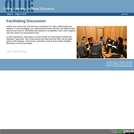
Facilitating Discussions
- Subject:
- Education
- Material Type:
- Activity/Lab
- Reading
- Provider:
- AEA
- Provider Set:
- OLLIE
- Author:
- Evan Abbey
- Date Added:
- 12/01/2016

Facilitating Discussions
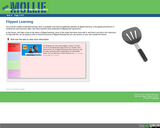
Flipped Learning
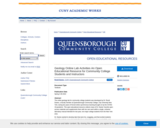
The online geology lab for community college students was developed by Dr. Rondi Davies, a faculty member at Queensborough Community College, City University New York, during two years of forced online synchronous learning brought on by the COVID-19 pandemic. This open educational resource collects many of Dr. Davies’ favorite open-access materials and supplements them with her own work within a single, cohesive laboratory manual intended for two-year, non-major college students from the New York area.
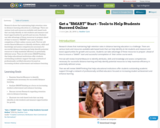
Research shows that maintaining high retention rates in distance learning education is a challenge. There are various tools and resources available web-based tools that can help identify at-risk students and measure and boost opportunities for growth and success. Students can take advantage of these resources to prepare ahead of time to ensure a "SMART" start and successful completion of their online course work.
First we will review SmarterMeasure to identify attributes, skills and knowledge and assess competencies necessary for successful distance learning and help identify potential resources to help maximize efficiency in potentially deficient areas.
Then we will review SMARThinking that helps educational institutions offer students outstanding academic support through a network of professionally certified educators focused on increasing student achievement and enhance learning.
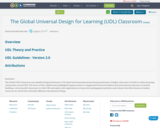
The Global UDL Classroom was initially designed between a U.S. based and international partnering institution of higher education to build an online learning community around UDL. The focus of this collaboration highlighted opportunities to engage both doctoral students and international educators in jointly building a virtual model classroom to study UDL principles, pilot applications of innovative pedagogical methods, and evaluate the effectiveness of online resources in varied and culturally different educational settings.
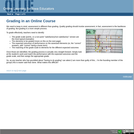
Grading in an Online Course
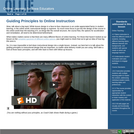
Guiding Principles to Online Instruction
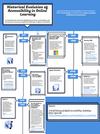
A comprehensive overview highlighting key laws, technologies, and best practices that have shaped the landscape of digital accessibility.This work is created for the College Project.
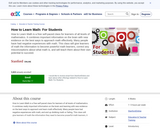
How to Learn Math is a free self-paced class for learners of all levels of mathematics. It combines really important information on the brain and learning with new evidence on the best ways to approach and learn math effectively. Many people have had negative experiences with math, and end up disliking math or failing. This class will give learners of math the information they need to become powerful math learners, it will correct any misconceptions they have about what math is, and it will teach them about their own potential to succeed and the strategies needed to approach math effectively.
Permitted use: the texts, exams, video, images, and other instructional materials provided with the courses and programs offered on the edX Site are for your personal use in connection with those courses and programs only.
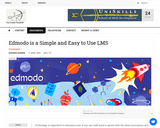
Edmodo, as an LMS being used worldwide, has been integral to those who got exposed to its utility, even once. Edmodo has an assessment and evaluation segment as well where the teacher can create and execute a quiz based assessment. Besides giving assignments and grading them, the Quiz feature gives us an opportunity to conduct a real-time, online assessment.
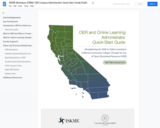
This OER campus administrator guide, officially entitled "OER & Online Learning: Administrator Quick Start Guide, Strengthening the Shift to Online Learning in California Community Colleges Through the Use of OER", is an outcome of a project by ISKME, supported by a grant from the Michelson 20MM Foundation, to conduct a study and develop a set of resources to accelerate OER use for distance education, especially the urgent shift to remote learning during the pandemic in 2020.
The Guide, created in collaboration with a selection of OER and online education champions across California community colleges (CCC), seeks to support community college administrators in California and beyond in more effectively supporting faculty use of OER as they work to address the reality of online learning in response to COVID-19 and future disruptions. The guide provides quick tips and starting points for campus administrators as they work to create the policy and practice environments needed to foster increased OER use for online learning.
See the associated OER and Online Learning: Faculty Quick-Start Guide for more in-depth tools and resources targeted to faculty and instructional design support, at: https://www.oercommons.org/courses/oer-online-learning-faculty-quick-start-guide
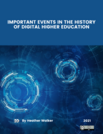
The blog post series Important Events in the History of Digital Higher Education was originally published on the website of the Digital Higher Education Consortium of Texas (DigiTex) and has now been compiled into a booklet for ease of use. In this series, you will find articles covering five pivotal moments in the history of digital higher education including the first "online" learning program at the Western Behavioral Sciences Institute, the Andrew Project at Carnegie Mellon University, Project Athena at Massachusetts Institute of Technology, Glenn Jones' Mind Extension University, and CALCampus, one of the first resources for online synchronous learning.
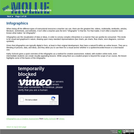
Infographics

Instructor's Tone
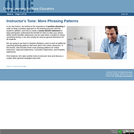
Instructor's Tone: More Phrasing Patterns
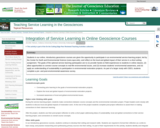
Students in our online, introductory geoscience courses are given the opportunity to participate in an environmental service learning project, led by the Center for Earth and Environmental Science (cees.iupui.edu), and reflect on the local and global impact of their service in a short writing assignment. The goals of the optional service learning participation are to (1) provide hands-on field experiences to students in online classes, (2) allow opportunities to connect course concepts to real-life environmental issues, and (3) increase students' environmental awareness, and (4) apply an understanding of sustainability to participation in environmental restoration projects. As part of a larger study with CEES, students complete a pre- and post-environmental awareness survey.
(Note: this resource was added to OER Commons as part of a batch upload of over 2,200 records. If you notice an issue with the quality of the metadata, please let us know by using the 'report' button and we will flag it for consideration.)
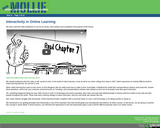
Interactivity in Designing Online Learning
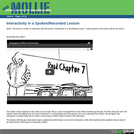
Interactivity in a Spoken/Recorded Lesson
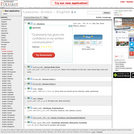
Internet Polyglot is a one stop free shop service that provides an enormous list of verbs, adverbs, and vocabulary words that cover a diverse array of subjects. To ease and enhance the learning process, this service provides the following types of interactive games: typing, guessing, mix, and matching. By creating an account, users are able to play the games with the full set of vocabulary words; and are able to generate their own individualized and specific list of vocabulary words with which they can play the above mentioned games.
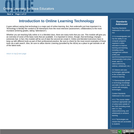
Introduction to Online Learning Tools